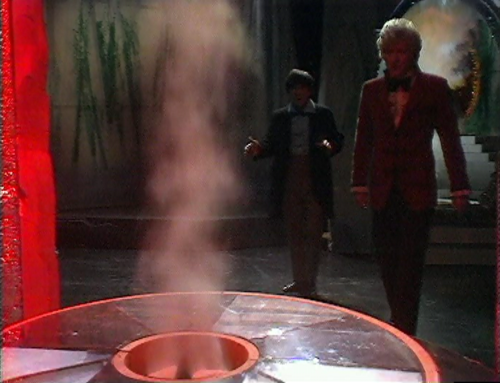It was interesting watching The Three Doctors
again recently. As a classic episode I have seen several times before, it struck me just how inadequate the special effects were for expressing the concepts the writers wanted to integrate into the story. A singularity that Omega had managed to harness looked like a flow of steam. Compare this image from “The Three Doctors” with one from “Journey to the Center of the TARDIS” and our glimpse of the Eye of Harmony which Omega helped harness:

Our ability to produce convincing special effects has changed so much in recent years. Of course, older special effects did not seem quite so bad then as they do now, as suspension of disbelief and imagination are always required. It is mostly the comparison with what can be done today that makes the older seem so very inadequate.
There's a lesson in this for those interested in the history of science, religion, and other areas. It is too easy to judge the accomplishments of people in the past by our own standards, in light of our own accomplishments made standing on their shoulders.
Nevertheless, the special effects limitations do create puzzles. Omega's will can order the antimatter universe in impressive ways, and yet the best he can muster to do his bidding are lumbering monstrosities?
The episode itself includes much that is entertaining. The Doctor essentially arguing with himself, or complaining about what he had become, provides many laughs. And it must have been a delight for longtime fans of the show to see William Hartnell and Patrick Troughton back on the show, to say nothing of seeing both of them together alongside Jon Pertwee.
Bringing them together is said by the timelords to be a violation of the “first law of time.” But because they are in dire straits, they have no choice but to seek the help not just of the Doctor, but of the Doctors.
For those who are familiar with the suggestion in the Cartmel Masterplan that the Doctor might have been one of the first timelords, this episode creates real problems. On the one hand, Omega seems to know the Doctor, albeit not from sight. On the other hand, the Doctor indicates that he did not know Omega personally, but had learned about him.
For those interested in the intersection of Doctor Who with religion, there is much that is of interest. When they reach the antimatter universe, Jo thinks they've died, but then comments that it doesn't look much like heaven. Omega says that he should not simply have been remembered and appreciated by the people of Gallifrey: “I should have been a god.” And there is commentary on the timelords and also Omega that they are not all-powerful.
The one reference that is most intriguing, from a religious perspective, is when they get a signal that someone is trying to get through to them. The Second Doctor asks “You don't think…?” and points upwards.
DOCTOR: Well, I… Excuse me. Someone's trying to get through to us.
DOCTOR 2: You don't think? (points up)
DOCTOR: I hardly think so.
Is this supposed to be a reference to God?
It turns out to be the First Doctor who is trying to contact them.
Have you seen The Three Doctors, whether a long time ago or recently (or both)? What are your thoughts about it?













